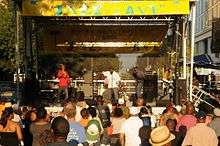Jazz on the Ave Music Festival
The Jazz on the Ave Music Festival (commonly referred to as Jazz on the Ave) is an annual Jazz Music Festival held on Cecil B. Moore Avenue in Philadelphia, Pennsylvania. It was founded by Beech Companies in 2006 and is organized by Beech Community Services.[1] The event features many genres of music, including jazz, soul, Gospel and R&B, as well as some contemporary urban music. Across the avenue, there are two stages that continuously host live music. The main stage resides at the corner of Broad Street and Cecil B. Moore Avenue, while the Philly Soul Stock stage is located at the meeting of 17th Street and Cecil B. Moore Avenue.
| Jazz on the Ave Music Festival | |
|---|---|
 Main stage at the Jazz on the Ave Music Festival 2016 | |
| Frequency | Annually |
| Location(s) | Philadelphia |
| Country | United States |
| Inaugurated | 2006 |
| Founder | Beech Community Services |
| Most recent | 2019 |
| Activity | Music |
History
In the 1940s through the 1960s, North Philadelphia housed 16 of the city's 30 jazz venues, with a significant number located on Cecil B. Moore Avenue (formerly Columbia Avenue). With the reputation as the “go to” area for the best entertainment in town, it was dubbed "Jump Street".[2]
Starting in 2006, Beech Community Services has continued this tradition with Jazz on the Ave. Beech Community Services presents this outdoor festival with support from company partners, volunteers and community residents. Festivals feature a variety of local and nationally acclaimed artists representing an eclectic mix of music. The event is traditionally hosted by local radio and TV personalities.
Beyond the music
In addition to hosting live music, Jazz on the Ave is a showcase for local vendors, talent and visual arts, including handmade jewelry and clothes, culinary art, drill teams and much more.
Throughout the years, both talent and vendor participation has grown in scale and variety. Beech Community Services is committed to the level of detail and artistry that is provided at the event.
Location
Jazz on the Ave takes place on Cecil B. Moore Avenue, located in the North Philadelphia community. This avenue has a musical history, having hosted John Coltrane, Ethel Waters, Billie Holiday and Dizzie Gillespie. Then named Columbia Avenue, and called the Golden Trip, the avenue was a famed destination for jazz entertainment during Philadelphia's golden era of jazz[3] from the 1940s through the early 1960s.
Impact and legacy
Jazz on the Ave is a part of Beech Community Services' way of giving back to the Cecil B. Moore community and continuing its role of revitalizing the area by providing social, educational and community services to its tenants – both residential and commercial.
“For ten years now, thousands continue to attend this summer concert, not just because it’s a great family and community event, but because it’s an opportunity to celebrate the great musical history of North Philly and the entire region,” states Ken Scott, President of Beech Companies.
“I love the diversity of this event,” states Christine Brown, Director of Beech Community Services. “To have so many people, from so many backgrounds, come together and help us celebrate the history of jazz and other great music genres is humbling and will motivate us to continue producing this concert for the next 10 years and beyond.”
The community event brought hundreds of guests together to enjoy local music at no cost.[4]
References
- "Beech Community Services : Encouraging Residents to Take Charge of Their Community : Philadelphia, PA 19121". Retrieved October 28, 2016.
- "Jump Street". Retrieved October 28, 2016.
- "Jazz - Encyclopedia of Greater Philadelphia". Retrieved October 28, 2016.
- "In Case You Missed It: Here's Some Awesome Pics From Last Week's "Jazz on the Ave" Festival – Spirit News". Spirit News. August 3, 2016. Retrieved October 25, 2016.